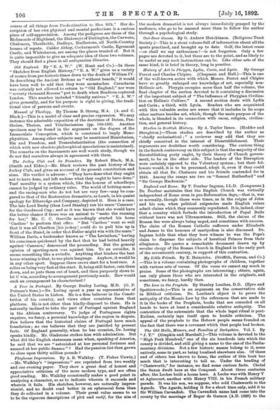The Jockey Club and its Founders. By Robert Black, M.A.
(Smith and Elder.)—Mr. Black reviews the past history of the Jockey Club, and gives an account of its present constitution and aims. His verdict is adverse : " They have done what they ought not to have done, and left undone what they ought to have done." Turf morality is a system which, like the honour of schoolboys, cannot be judged by ordinary rules. The world of betting-men- and the racing-men who do not bet are very few—may be com- pared to that of the Restoration dramatists, as Lamb, in his quaint apology for Etheredge and Company, depicted it. Here is a case. The late Lord Derby (then Lord Stanley) ran his mare Canezou for the Goodwood Cup ; and as it was known that she would have the better chance if there was an animal to "make the running for her," Mr. C. C. Greville accordingly started his horse ' Cariboo ' to perform that office. "But ` Cariboo ' went so well that it was all Charlton [his jockey] could do to pull him up in front of the Stand, in order that Butler might win with the mare." William Davis, a bookmaker known as " The Leviathan," having his conscience quickened by the fact that he had betted heavily against Canezou,' denounced the proceeding. But the general opinion of sporting-men was against him. To an outsider, it seems something like a swindle. Anything that hinders the best horse winning is that, to use plain language. Anyhow, it would be in any other sport. Suppose three crews start for a boat race. A relies on being very fast at the start. B, being still faster, cuts them down, and so puts them out of heart, and then purposely slows to let C win, according to arrangement previously made. How would such an arrangement be characterised P


































 Previous page
Previous page